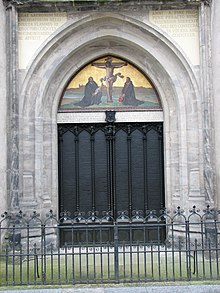 |
| Downtown Vilnius |
A few weeks, I had the opportunity to attend a WorldVenture training conference in Lithuania offered for all missionaries in Europe and the Middle East.
Nate attended this conference in the spring and they offered it twice in the year so couples like us with little kids could take turns. I was so thankful for the chance to attend.
 |
| Sessions in the hotel |
It was a really refreshing week for me, not only because it was a break from the everyday and a chance to get away and relax a little, but especially because of all the great training content and conversations with other missionaries.
There is something special about missionaries getting together, even if they have never met, because we all understand each other and the experiences we've gone through integrating into a new culture and learning a language. The worship and prayer times were also incredibly refreshing, since on most Sunday mornings here I miss part or all of the service because of the kids.
The main thrust of the conference was about skills in interpersonal relationships. It sounds like such a basic topic, but all of us need to constantly be striving to improve how we relate with others. This affects
everything we do - our ministry in the church, how we care for others outside the church, how we have healthy marriages and family relationships, and everything in between. We discussed topics like encouragement, trust, listening, healthy rest, moral purity and conflict resolution. It was especially interesting to discuss how these topics each play out uniquely in our culture where we live, in comparison to American culture where we may be most comfortable.
 |
| We visited a Lithuanian Castle midway through the week |
 |
| New friends! |
The leadership of Europe and the Middle East for WorldVenture was there at the conference teaching the content. Informally, though, at meal times and in between times, they were also there to discuss how we are doing and questions we may have about things at the mission. Having these conversations in person is so valuable, and I was really thankful to get some questions answered about some recent financial changes and to get to know some people in leadership positions that I hadn't met before.
I'm so thankful for WorldVenture and that it makes it a priority to offer conferences like these, where we can come away with practical learning and new relationships and connections. And I'm thankful for Nate, who stayed home with the kids so I could attend!
 In many protestant communities today is Reformation day. This is not just because they want an alternative to Halloween. On October 31, 1517 Martin Luther nailed his 95 Theses to the door of the church in Wittenberg. It was one of the definitive acts of the Reformation.
In many protestant communities today is Reformation day. This is not just because they want an alternative to Halloween. On October 31, 1517 Martin Luther nailed his 95 Theses to the door of the church in Wittenberg. It was one of the definitive acts of the Reformation. In many protestant communities today is Reformation day. This is not just because they want an alternative to Halloween. On October 31, 1517 Martin Luther nailed his 95 Theses to the door of the church in Wittenberg. It was one of the definitive acts of the Reformation.
In many protestant communities today is Reformation day. This is not just because they want an alternative to Halloween. On October 31, 1517 Martin Luther nailed his 95 Theses to the door of the church in Wittenberg. It was one of the definitive acts of the Reformation.





